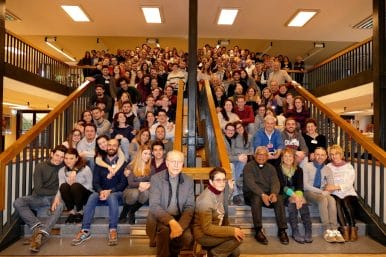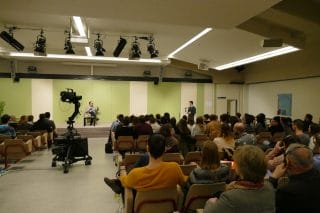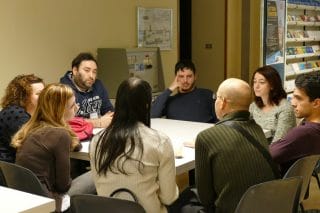 The international conference for engaged couples held in Castel Gandolfo (Rome) has just ended. It was organised by the New Families Movement of the Focolare, and attracted the participation of 65 couples. Besides addressing the issue of personal choice and identifying and overcoming crises in relationships, with a special focus on communication, affection and spirituality, what impressed most were the real-life stories shared by couples. One example was the experience shared by Massimo and Francesca from Rome, married for 17 years, both managers in a Telecom company and the latter, also a teacher of Italian to foreign students. Francesca: According to the doctors, we would not be able to have children, and even if there would be a pregnancy, the certainty of success would not be assured. It was a sentence without appeal. After a prior moment of distress, a reassuring conviction made its way: fertility lies not only in a biological capacity, but in being able to generate love around you. So we continued to bring ahead, with unchanged enthusiasm, the initiatives that had accompanied the choices we had made in our youth to work for others. We would also be open to life, albeit the fear of serial and traumatic miscarriage.
The international conference for engaged couples held in Castel Gandolfo (Rome) has just ended. It was organised by the New Families Movement of the Focolare, and attracted the participation of 65 couples. Besides addressing the issue of personal choice and identifying and overcoming crises in relationships, with a special focus on communication, affection and spirituality, what impressed most were the real-life stories shared by couples. One example was the experience shared by Massimo and Francesca from Rome, married for 17 years, both managers in a Telecom company and the latter, also a teacher of Italian to foreign students. Francesca: According to the doctors, we would not be able to have children, and even if there would be a pregnancy, the certainty of success would not be assured. It was a sentence without appeal. After a prior moment of distress, a reassuring conviction made its way: fertility lies not only in a biological capacity, but in being able to generate love around you. So we continued to bring ahead, with unchanged enthusiasm, the initiatives that had accompanied the choices we had made in our youth to work for others. We would also be open to life, albeit the fear of serial and traumatic miscarriage.  Two years had not passed when we discovered that we were expecting a baby. As foreseen, the pregnancy was difficult, and progressed despite the verdicts of the doctors who continued to remind us of the serious risks entailed and the care we had to take. In those difficult moments we prayed to God, the author of life, which made us even more conscious of the preciousness of that little bundle which wanted to grow inside me despite the severe opinion of the doctors. The doctors were astounded when at the end of term, Alessandro was born very healthy, and I too was well, though they even told us: now you have a child, do not dare venture beyond. Massimo: Instead we were still open to life and after a few years, a new pregnancy came up, followed by a new wave of amazement, skepticism and recommendations of the doctors. At the advanced stage, there was a suspicion of the Down syndrome, to be ascertained through an amniocentesis. Once again, despite the trauma of this news, we felt that the certainty of God’s love was stronger for us and our baby, to whom we wanted to give an unconditional welcome. Those were months of fear and distress which we again overcame by targeting not to remain entangled by the suffering but to live it as an occasion to love one another and all around us. At Matteo’s birth they told us that he did not have the Down syndrome, but a heart malformation which required hospitalization until when he could be operated, at four months of age.
Two years had not passed when we discovered that we were expecting a baby. As foreseen, the pregnancy was difficult, and progressed despite the verdicts of the doctors who continued to remind us of the serious risks entailed and the care we had to take. In those difficult moments we prayed to God, the author of life, which made us even more conscious of the preciousness of that little bundle which wanted to grow inside me despite the severe opinion of the doctors. The doctors were astounded when at the end of term, Alessandro was born very healthy, and I too was well, though they even told us: now you have a child, do not dare venture beyond. Massimo: Instead we were still open to life and after a few years, a new pregnancy came up, followed by a new wave of amazement, skepticism and recommendations of the doctors. At the advanced stage, there was a suspicion of the Down syndrome, to be ascertained through an amniocentesis. Once again, despite the trauma of this news, we felt that the certainty of God’s love was stronger for us and our baby, to whom we wanted to give an unconditional welcome. Those were months of fear and distress which we again overcame by targeting not to remain entangled by the suffering but to live it as an occasion to love one another and all around us. At Matteo’s birth they told us that he did not have the Down syndrome, but a heart malformation which required hospitalization until when he could be operated, at four months of age.  Francesca: In those four months, the fatigue, and above all the inability to face the pain of an innocent child, brought moments of misunderstanding between us. That propensity to love one another at times seemed to disappear, also because I wanted to stay in the hospital with Matteo and Massimo at home with Alessandro or at work. We saw each other only in the ward and often a wrong word sufficed to flare up. Massimo: One evening, after visiting them in the hospital, upon saying goodbye in the corridor both of us felt the need for a sincere, beneficial, heart-to-heart dialogue. We understood that among the many worries, the only one which should be heeded was that of loving each other. And even now, when the inevitable daily tensions seem to take the upper hand, we go back to remembering those moments of light in which also as a family, suffering has regenerated us to a truer love.
Francesca: In those four months, the fatigue, and above all the inability to face the pain of an innocent child, brought moments of misunderstanding between us. That propensity to love one another at times seemed to disappear, also because I wanted to stay in the hospital with Matteo and Massimo at home with Alessandro or at work. We saw each other only in the ward and often a wrong word sufficed to flare up. Massimo: One evening, after visiting them in the hospital, upon saying goodbye in the corridor both of us felt the need for a sincere, beneficial, heart-to-heart dialogue. We understood that among the many worries, the only one which should be heeded was that of loving each other. And even now, when the inevitable daily tensions seem to take the upper hand, we go back to remembering those moments of light in which also as a family, suffering has regenerated us to a truer love.
Put love into practice
Put love into practice




0 Comments